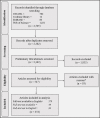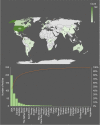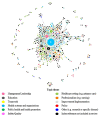The influence of complexity: a bibliometric analysis of complexity science in healthcare
- PMID: 30904877
- PMCID: PMC6475366
- DOI: 10.1136/bmjopen-2018-027308
The influence of complexity: a bibliometric analysis of complexity science in healthcare
Abstract
Objectives: To analyse trends in the academic literature applying complexity science to healthcare, focusing specifically on bibliometric characteristics and indicators of influence.
Design: This study reports a bibliometric analysis via a systematic search of the academic literature applying complexity science to healthcare.
Method: A search of four academic databases was performed on 19 April 2018. Article details were downloaded and screened against inclusion criteria (peer-reviewed journal articles applying complexity science to healthcare). Publication and content data were then collected from included articles, with analysis focusing on trends over time in the types and topics of articles, and where they are published. We also analysed the influence of this body of work through citation and network analyses.
Results: Articles on complexity science in healthcare were published in 268 journals, though a much smaller subset was responsible for a substantial proportion of this literature. USA contributed the largest number of articles, followed by the UK, Canada and Australia. Over time, the number of empirical and review articles increased, relative to non-empirical contributions. However, in general, non-empirical literature was more influential, with a series of introductory conceptual papers being the most influential based on both overall citations and their use as index references within a citation network. The most common topics of focus were health systems and organisations generally, and education, with recent uptake in research, policy, and change and improvement.
Conclusions: This study identified changes in the types of articles on complexity science in healthcare published over time, and their content. There was evidence to suggest a shift from conceptual work to the application of concrete improvement strategies and increasingly in-depth examination of complex healthcare systems. We also identified variation in the influence of this literature at article level, and to a lesser extent by topic of focus.
Keywords: bibliometrics; complex adaptive systems; complexity science; health care; healthcare; review.
© Author(s) (or their employer(s)) 2019. Re-use permitted under CC BY-NC. No commercial re-use. See rights and permissions. Published by BMJ.
Conflict of interest statement
Competing interests: None declared.
Figures





Similar articles
-
Occupational therapy publications by Australian authors: A bibliometric analysis.Aust Occup Ther J. 2018 Aug;65(4):249-258. doi: 10.1111/1440-1630.12453. Epub 2018 Jan 18. Aust Occup Ther J. 2018. PMID: 29344965
-
A comparative bibliometric analysis of the top 150 cited papers in hypospadiology (1945-2013).J Pediatr Urol. 2015 Apr;11(2):85.e1-85.e11. doi: 10.1016/j.jpurol.2014.11.022. Epub 2015 Mar 4. J Pediatr Urol. 2015. PMID: 25819379
-
Otolaryngology Education: Recent Trends in Publication.Otolaryngol Head Neck Surg. 2017 Jun;156(6):1124-1129. doi: 10.1177/0194599816684098. Epub 2016 Dec 27. Otolaryngol Head Neck Surg. 2017. PMID: 28025905
-
[Breast pathology: evaluation of the Portuguese scientific activity based on bibliometric indicators].Acta Med Port. 2006 May-Jun;19(3):225-34. Epub 2006 Sep 7. Acta Med Port. 2006. PMID: 17234084 Review. Portuguese.
-
Stress in nurses: The 100 top-cited papers published in nursing journals.J Adv Nurs. 2018 Jul;74(7):1488-1504. doi: 10.1111/jan.13566. Epub 2018 Apr 6. J Adv Nurs. 2018. PMID: 29516543 Review.
Cited by
-
Current definitions of advanced multimorbidity: a protocol for a scoping review.BMJ Open. 2023 Nov 30;13(11):e076903. doi: 10.1136/bmjopen-2023-076903. BMJ Open. 2023. PMID: 38035744 Free PMC article.
-
Global Trends and Evidence Gaps in Medical Errors Research: A Mixed-Methods Scientometrics Study.J Multidiscip Healthc. 2025 May 3;18:2497-2508. doi: 10.2147/JMDH.S516383. eCollection 2025. J Multidiscip Healthc. 2025. PMID: 40336913 Free PMC article.
-
Implementation processes in a cognitive rehabilitation intervention for people with dementia: a complexity-informed qualitative analysis.BMJ Open. 2021 Oct 26;11(10):e051255. doi: 10.1136/bmjopen-2021-051255. BMJ Open. 2021. PMID: 34702730 Free PMC article. Clinical Trial.
-
A novel perspective of Australian primary care dietetics: Insights from an exploratory study using complex adaptive systems theory.Nutr Diet. 2022 Sep;79(4):469-480. doi: 10.1111/1747-0080.12742. Epub 2022 Jun 12. Nutr Diet. 2022. PMID: 35692187 Free PMC article.
-
The nursing practice environment and hospital sociotechnical complexity: a mixed-methods study.Rev Bras Enferm. 2024 Dec 16;77(6):e20230315. doi: 10.1590/0034-7167-2023-0315. eCollection 2024. Rev Bras Enferm. 2024. PMID: 39699355 Free PMC article.
References
-
- Byrne D. Complexity theory and the social sciences: an introduction. London: Routledge, 2002.
-
- Chu D, Strand R, Fjelland R. Theories of complexity. Complexity 2003;8:19–30. 10.1002/cplx.10059 - DOI
-
- Waldrop MM. Complexity: the emerging science at the edge of order and chaos: Simon and Schuster, 1993.
-
- Dent EB. Complexity science: a worldview shift. Emergence 1999;1:5–19. 10.1207/s15327000em0104_2 - DOI
Publication types
MeSH terms
LinkOut - more resources
Full Text Sources
Miscellaneous
